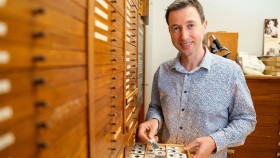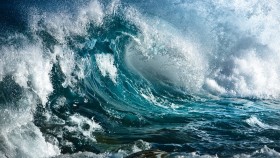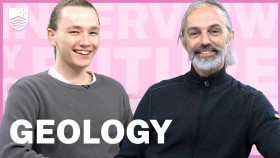Weidong Sun
Weidong grew up in a small village in Eastern China and began studying at the University of Science and Technology of China. He was about to finish his PhD in China when he contacted Dr. Shen-su Sun who suggested that he should apply for an international scholarship to study a PhD at ANU. Weidong remembers it was a big decision “my wife and I had good jobs in China, and my daughter Xixi was only six months old, but in 1999 we decided to move to Canberra. It turned out to be the most life-changing decision I have ever made”. Weidong remembers that his family very much enjoyed their time in Canberra, where his wife worked in the National Library cataloguing the Chinese books. Weidong also proudly remembers that whilst he was in Canberra he was President for one year of the Chinese Scholars and Students in Canberra and helped to set up the Federation of Chinese Associations.
When Weidong commenced his PhD at RSES he identified that the behaviour of Rhenium was not very well understood. He decided he would concentrate his thesis on Rhenium as he hoped it would provide some useful information about the crustmantle interaction during plate subduction and he believed it was important to understand the behaviour of the Rhenium as the Re-Os isotope system is controlled by it. He notes, however, that this wasn’t so easy! Yet Weidong credits his supervisory panel, chaired by Dr Vickie Bennett and Dr Ian Williams, as he had access to world-class academics to learn from and collaborate with on his panel. He remembers that the first project he did when he started during his PhD was to work with Ian Williams on determining the age of eclogite from the Dabie Mountains in China, which used multiple methods to constrain the geological meaning of zircon ages.
When asked about some of his favourite memories at RSES Weidong exclaims that “RSES is a wonderful place, it’s one of the greatest institutions for this in the world – it is very special in terms of geochemistry because of the Shrimp facility. I got to do a lot of analysis and lab work here and it was the most important part that helped me to upgrade my research”. After Weidong finished his PhD at ANU, he was successful in applying for an Alexander von Humboldt fellowhip at the prestigious Max-Planck Institute of Chemistry in Germany. He considers himself very lucky to have been a post-doc fellow studying with Professor Hofmann, a famous geochemist. It wasn’t long however until his talents were recognised in China and after two and a half years in Germany Weidong returned to China as a Professor as part of the ‘100 talented Young Scientists Project’ operated by the Chinese Academy of Sciences.
Even though he graduated in 2003, Weidong notes that he still has a strong connection to RSES. “When I returned to China, I was able to start to introduce ANU to my colleagues”. He mentions that he is still in touch with this PhD supervisors and has just submitted a paper with Ian Williams. From his time at ANU, Weidong has been able to strengthen the relationship between the Guangzhou Institute of Geochemistry, “We have lots of ANU visitors in China from Earth Sciences and I am thinking of sending a PhD student here”. Weidong also notes that he came back to RSES twice in 2011 to talk about shrimp and established a collaboration agreement between RSES and the Guangzhou Institute of Geochemistry.
Whilst Weidong says that he plans to stay in China he shares some final advice for his fellow alumni and aspiring PhD students “try hard when you are at ANU because it is such a good place for scientific training and research. Try to speak to other supervisors. If you learn from different people it is very easy for you to become a better scientist. RSES provides the best opportunity for you to do the best work on your PhD and it totally changed my career”.








